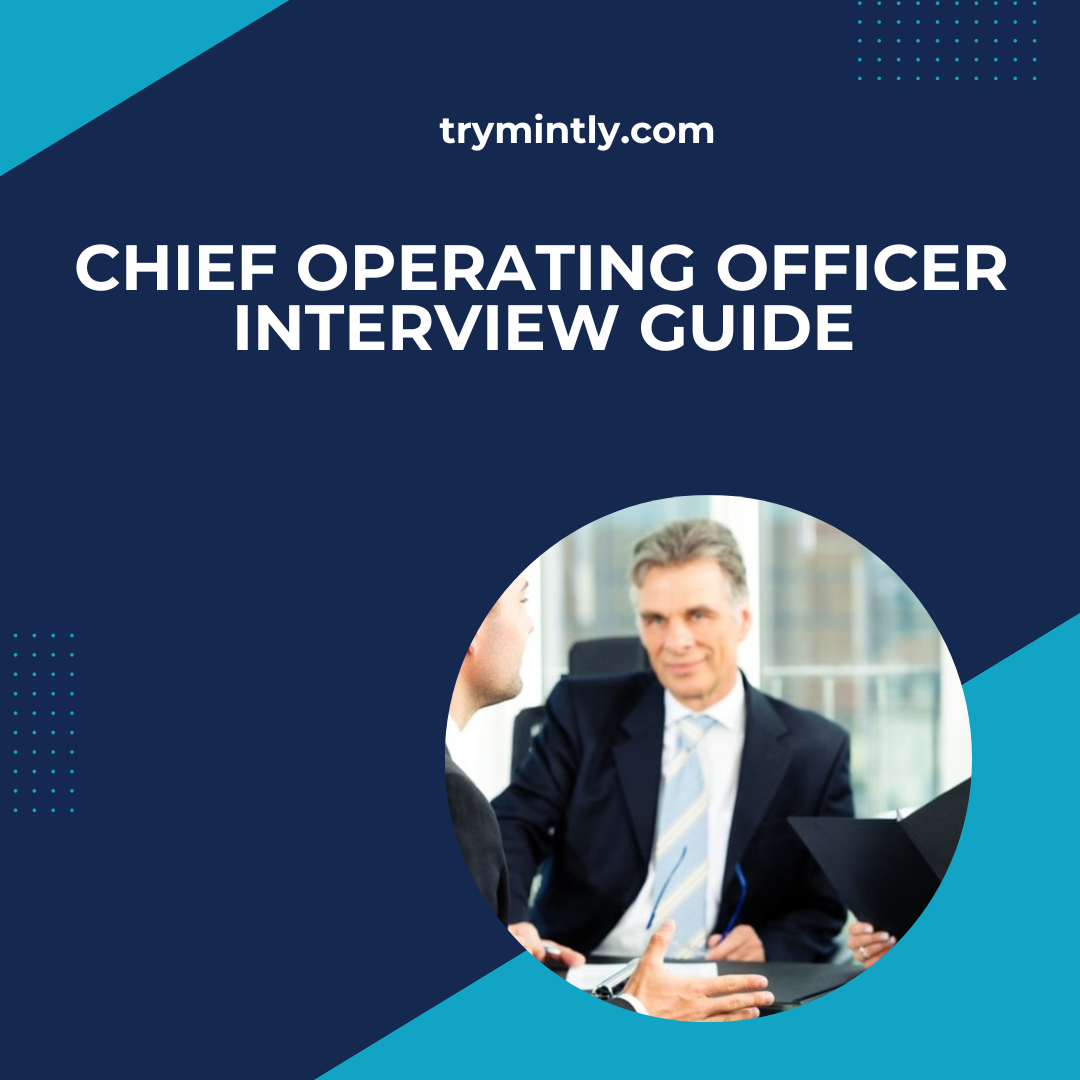The process of finding a new Chief Operating Officer (COO) can be stressful and time-consuming. Organizations must ensure they find the right person for the role, and having the right interview questions to ask is key. This blog post will provide the COO interview questions that can help recruiters identify candidates with the skillset and experience needed to become a successful executive. Any Prospective Applicant can review these questions while preparing for the interview.
Interviewing a COO
The Chief Operating Officer (COO) is an important position in any business. As the second-in-command, the COO provides leadership and oversees day-to-day operations for the entire organization. It is therefore essential to interview a potential COO with care and attention. During this process, it’s important to determine if they possess the necessary qualities to effectively lead your organization.
Before deciding who to bring on as COO, it’s best to consider what this role entails and what qualities you should look for in a candidate. You’ll want someone who is willing to take on responsibility, has strong problem solving skills, excellent organizational skills and great communication abilities. Furthermore, it’s best for the COO to have strong knowledge of your industry so that they are able to actively engage with customers and employees alike.
Picturing the Ideal Candidate is very critical for the role. Unlike mid-level or sr level roles, hiring C level roles takes more due diligence.
General Questions
C-suite interviews can be complex and grueling, especially for those seeking a Chief Operating Officer (COO) position. As the second in command, COOs must have an in-depth understanding of the organization’s operations, as well as what it takes to lead a successful team. To determine if you are qualified for the job, employers are likely to ask some general questions during your interview.
When interviewing for a COO position, expect questions that explore your past successes and how they could help contribute to their company’s success. Employers may also ask how you would handle certain situations or tasks that might arise during your tenure at their organization. Additionally, they may pose questions about your management style and techniques used to motivate teams.
Qualifications: Education, Experience
Qualifications: Education, Experience are two of the most important requirements for a successful Chief Operating Officer (COO) interview. Aspiring COOs must be able to demonstrate their qualifications in both areas and answer related questions during an interview with confidence. During the interview process, employers may ask potential COOs specific questions about their educational background and experience in order to determine if they meet the requirements for this high-level position.
It is essential that potential COOs have a solid educational foundation in business administration or operations management, as well as previous leadership experience. Questions asked by employers may include inquiries about degrees earned, certifications received, and any other relevant training programs completed. Employers may also want to know more about the candidate’s prior work history, such as number of years spent working at certain organizations and details of any successful projects managed previously.
Leadership: Style, Team Building
Leadership: Style, Team Building are two key elements to successful team building and management. In today’s competitive business environment, it is essential for Chief Operating Officers (COOs) to have a clear understanding of both these concepts in order to effectively lead their teams.
A common interview question posed to potential COOs is “How would you describe your leadership style?” This question provides insight into how the candidate views themselves as a leader and if they have the ability to develop and maintain strong working relationships with their colleagues.
An effective leader must be able to create an environment that encourages collaboration among team members while also providing direction and expectations. A leader should demonstrate respect towards subordinates while inspiring others through positive reinforcement, sound decision-making, and timely feedback.
Everyone is different. Every leader has unique style of handling things. There is always a cross line where some style couldn’t align with company culture. A COO applicant has to be mindful about this culture fitment.
Management: Goals, Problem Solving
Among the most important responsibilities of a COO is setting and achieving organizational goals. One of the key questions employers ask during interviews for COOs is how they would set and work toward these goals. An effective answer to this question requires an understanding of goal setting, problem solving, and communication skills.
Goal setting involves identifying what needs to be accomplished, developing action plans for achieving these objectives, and monitoring progress along the way. Problem solving requires thinking outside the box in order to find creative solutions. Communication skills are essential for informing stakeholders about progress on projects as well as any challenges that may arise throughout the process.
COO candidates should be prepared with thoughtful answers regarding their approach to goal-setting, problem-solving, and communication strategies when interviewing for a position. Employers want to know that they have hired someone who will manage effectively while meeting organizational objectives.
Communication: Listening, Feedback
Effective communication is a key factor in the success of any business and understanding how to effectively listen and provide feedback is essential for any leader. Many companies use communication-related questions during job interviews to evaluate potential candidates, especially when seeking executives like Chief Operating Officers (COO).
Interviewers want to know that potential candidates understand the importance of effective communication. Answering open-ended questions about listening and providing feedback can demonstrate an individual’s ability to practice active listening, articulate their thoughts, provide constructive criticism, and demonstrate empathy when dealing with clients or colleagues. Questions such as “How do you ensure that team members feel heard during meetings?” or “How do you handle situations where employees receive critical feedback?
Every company wants to hire people who can listen to instructions and accurately absorb information in order to understand tasks. This is especially important for executive level positions such as COOs, which require strong interpersonal skills. It’s important for companies to ask the right interview questions in order to evaluate potential candidates’ listening skills. Below are the top three COO interview questions that assess a candidate’s ability to listen effectively:
1. Tell me about a time when you had to quickly comprehend an unfamiliar problem and come up with solutions?
2. Describe a project where you had difficulty understanding instructions from your supervisor/client? How did you go about overcoming this challenge?
3. Provide an example of how you have provided feedback on someone else’s work?
Adaptability: Change Strategies
Adaptability: Change Strategies is a critical topic for companies looking to stay ahead in an ever-evolving business landscape. Knowing how to respond quickly and effectively to changing conditions, while also remaining agile enough to create opportunities is essential for success. Understanding the strategies used by successful executives and leaders to navigate change can help businesses develop their own processes for adapting in times of uncertainty.
COO interview questions often focus on candidates’ abilities to think strategically when it comes to navigating change. For example, they might want to know if they have a process or framework they use when making decisions that require quick action or long-term planning. Adaptability is key; successful COOs must be able not only to recognize potential changes but also anticipate them so that the company has time to adjust its operations accordingly.
Business Acumen: Decisions, ROI
Business acumen is an essential skill for any COO (Chief Operating Officer) to possess. As the COO, they are responsible for both making and executing decisions that will ensure the success of their organization. When interviewing candidates for this position, it is important to ask questions related to their decision-making process and how they measure return on investment (ROI).
When asking about a candidate’s decision-making process, questions should focus on the steps taken when creating a solution such as gathering data, weighing options, and considering potential risks or rewards. During the interview, assess their ability to think strategically in order to make decisions that benefit their organization in the long run.
Questions related to ROI should focus on how they measure successes and failures. This could include inquiries into what metrics they use or how they calculate costs associated with particular decisions made over time.
Top Questions in the COO Interview
1. Can you elaborate a time or situation when you have successfully implemented change in the organization? How it added value to the company?
As a leader and change maker, implementing major changes that help to improve the company is an important skill to have. When asked in an interview what example of a time when you implemented a major change that helped the company, it is important to provide an answer with detail and clarity.
A good response would be one that explains how the change was made, how it benefited the company and any feedback or results from making this alteration. For instance, if you were able to implement a new system that streamlined processes for better collaboration and communication within departments, explain how this saved time and money for your organization as well as what resulted from this shift. Additionally, include any positive feedback from colleagues or clients about these changes.
2. What Operational Tools and Systems you have worked with before?
When it comes to the executive level, COOs are responsible for a variety of operations. As part of any job interview process, it is important that potential COOs can demonstrate their knowledge and experience with different operational tools and systems. From automated IT systems to sophisticated automation solutions, understanding which tools you have worked with before can be an essential part of the interview process. As such, it is important to take time to understand what types of operational tools and systems you have worked with prior to the interview.
Building on your experiences, during an interview for a COO position you may be asked about specific technologies or processes related to IT systems or automation in which you have worked before. Your answers should provide insight into how well-versed you are in these areas and showcase your ability to apply that knowledge within business operations.
3. How would you keep track of our performance metrics?
If you are interviewing for a COO position, one of the topics that will likely come up is the ability to keep track of metrics and KPIs. Metrics, or key performance indicators (KPIs), are measurements used to gauge the effectiveness of different parts of an organization and can be powerful tools in assessing your progress. Knowing how to manage metrics is a critical skill for COOs, so it’s important to think carefully about how you would handle this task.
When answering questions related to tracking metrics, it’s helpful to focus on both the process and technology aspects involved. First, outline your approach for keeping track of KPIs: What systems will you use? How often will updates be reviewed? What redundancies can be introduced into the system? These are all important points that should be included in your answer.
Summary
In conclusion, selecting the best COO candidate for a company is a challenging but important task. It involves researching the potential candidates, conducting interviews, and analyzing the credentials and experience of each individual to make an informed decision.
Doing a thorough background check of the candidate’s present and past credentials is important too. This will help the hiring panel to finalize the right person for the Job.
By taking the time to assess every detail and consider all aspects of a COO’s profile, organizations can find the right person to take their business to the next level. Companies should conduct thorough searches and use their resources wisely in order to pick the best candidate available.






